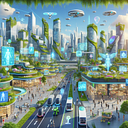Happiness vs. Fulfillment: What’s the Difference?
Happiness and fulfillment are two concepts that often get used interchangeably. However, they are fundamentally different in their nature and impact on our lives. Happiness is often seen as a fleeting emotion, while fulfillment is a deeper, more lasting state of being. Understanding the distinction between the two can help us navigate life with more clarity, making choices that lead to long-term satisfaction rather than temporary pleasure.
Defining Happiness and Fulfillment
What is Happiness?
Happiness is an emotional state characterized by joy, pleasure, and contentment. It is often influenced by external factors such as relationships, accomplishments, and material possessions. Happiness is generally short-term and can fluctuate depending on circumstances. For example:
- Getting a promotion at work can make you happy.
- Enjoying a delicious meal can bring temporary joy.
- Watching a funny movie can lift your mood.
While happiness is essential, it is not necessarily sustainable. The feeling of joy fades as situations change, requiring new sources of pleasure to maintain a positive state of mind.
What is Fulfillment?
Fulfillment, on the other hand, is a deeper sense of contentment that comes from living a meaningful life. Unlike happiness, fulfillment is not dependent on external circumstances. Instead, it is rooted in personal values, purpose, and long-term goals. Examples of fulfillment include:
- Feeling a sense of purpose from meaningful work.
- Contributing to society or helping others.
- Achieving personal growth and self-acceptance.
Fulfillment provides a lasting sense of satisfaction because it is derived from intrinsic motivation rather than external rewards.
Key Differences Between Happiness and Fulfillment
1. Short-Term vs. Long-Term
Happiness is often temporary, triggered by specific events or experiences. It is a momentary feeling that comes and goes. In contrast, fulfillment is long-term and provides a consistent sense of purpose and satisfaction.
2. External vs. Internal
Happiness is largely influenced by external factors such as success, relationships, and material wealth. It can be unpredictable and subject to external conditions. Fulfillment, however, is internal and comes from living in alignment with one’s values and purpose.
3. Pleasure vs. Meaning
Happiness is often associated with pleasure and comfort. It can be as simple as enjoying a good meal or a fun activity. Fulfillment, on the other hand, is tied to deeper meaning and personal growth. It may not always bring immediate joy, but it creates lasting contentment.
4. Instant Gratification vs. Long-Term Effort
Happiness often results from instant gratification — getting what we want in the moment. Fulfillment, however, requires effort, patience, and persistence. It involves working toward long-term goals, even if they require sacrifice and hard work.
5. Emotional Highs vs. Inner Peace
Happiness comes in waves, bringing emotional highs that eventually fade. Fulfillment is more stable, leading to inner peace and a deeper sense of well-being.
The Relationship Between Happiness and Fulfillment
While happiness and fulfillment are different, they are not mutually exclusive. In fact, they can complement each other. Pursuing fulfillment often leads to more sustained happiness, while moments of happiness can contribute to a fulfilling life.
For example, a person who dedicates their life to a meaningful cause may experience daily struggles but still feel fulfilled. At the same time, they can find happiness in small moments along the way — celebrating milestones, enjoying the company of loved ones, or experiencing personal growth.
How to Cultivate Fulfillment Over Happiness
While happiness is important, prioritizing fulfillment leads to a more meaningful life. Here are some ways to cultivate fulfillment:
1. Define Your Purpose
Take time to reflect on what truly matters to you. Identify your passions, values, and long-term goals. Living with purpose provides a sense of direction and lasting satisfaction.
2. Focus on Personal Growth
Invest in self-improvement and lifelong learning. Whether it’s developing new skills, overcoming challenges, or striving for self-awareness, growth leads to deeper fulfillment.
3. Build Meaningful Relationships
True fulfillment comes from deep connections rather than surface-level interactions. Surround yourself with people who uplift and inspire you.
4. Give Back to Others
Acts of kindness and contributing to the well-being of others can bring profound fulfillment. Volunteering, mentoring, or supporting loved ones can create a sense of purpose.
5. Embrace Challenges
Difficulties and struggles are part of the journey toward fulfillment. Rather than avoiding discomfort, view challenges as opportunities for growth and resilience.
6. Practice Gratitude
Being grateful for what you have shifts your perspective from chasing happiness to appreciating the present. Gratitude fosters contentment and deeper fulfillment.
7. Balance Enjoyment with Meaning
While pursuing fulfillment, don’t neglect moments of happiness. Find joy in small pleasures while working toward long-term goals.
Final Thoughts
Happiness and fulfillment are both essential to a well-lived life, but they serve different purposes. Happiness brings temporary joy, while fulfillment provides deep, long-lasting satisfaction. By prioritizing meaningful goals, embracing challenges, and staying true to personal values, we can cultivate a life that is both happy and fulfilling.
Instead of chasing fleeting moments of joy, aim for a life filled with purpose, growth, and deep contentment. When happiness fades, fulfillment remains.
